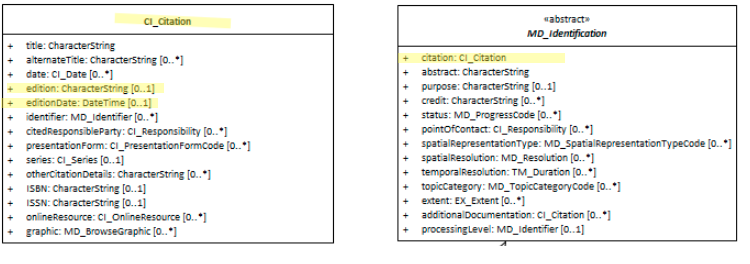Resource Edition ★★★★
For resources that change over time, it is important to users and resource managers that the edition changes be tracked in the metadata. This informs the user if they have the particular edition they need for their purpose.
| Element Name | edition |
| Parent | MD_Metadata.identificationInfo>MD_Identificationcitation>CI_Citation |
| Class/Type | characterString |
| Governance | Common ICSM, Agency, Domain |
| Purpose | Discovery, Identification |
| Audience | machine resource - ⭑ ⭑ ⭑ |
| general - ⭑ ⭑ ⭑ ⭑ ⭑ | |
| resource manager - ⭑ ⭑ ⭑ ⭑ | |
| specialist - ⭑ ⭑ ⭑ | |
| Metadata type | descriptive, administrative |
| ICSM Level of Agreement | ⭑⭑⭑⭑ |
- Path - MD_Metadata.identificationInfo>MD_DataIdentification.citation>CI_Citation.edition
- Governance - Agency, Domain
- Purpose - Discovery, identification
- Audience -
- machine resource - ⭑⭑⭑
- general - ⭑⭑⭑⭑⭑
- data manager - ⭑⭑⭑⭑
- specialist - ⭑⭑⭑
- Metadata type - descriptive, administrative
- ICSM Level of Agreement - ⭑⭑⭑⭑
Definition
Version of the cited resource.
ISO Obligation
- There can be at most one [0..1] edition entries for the cited resource in the MD_Identification.citation package in a metadata record. These are of type characterString. The resource may be of type Data MD_DataIdentification or of type Service *[SV_ServiceIdentification]
Discussion
The [0..1] cardinality of edition and editionDate means that release of a new edition of a resource requires the creation of a new metadata record. When such is the case, these two elements should be populated. The population of the edition element mandates the population of the editionDate element.
This element should be used wherever there’s a usable edition/version as it is invaluable to know where this resource fits into a sequence. As “version” is often synonymous with “edition”, it is advised that this field also be used for new tracked versions of resources.
ICSM Best Practice Recommendations
Therefore - when a new edition of a resource is created, a new metadata record needs to be created. This new metadata record needs the resource edition element populated with the edition name or identifier. When such is the case, the sibling CI_Citation.editionDate field should also be populated.
The edition element should be populated with the edition name.
This element should be updated in a consistent yet to be agreed upon manner within an agency.
Recommended Sibling Elements
- editionDate - (type - DateTime)[0..1] date of the edition. Should be populated with the date of the publication of the new edition.
Also Consider
- Resource Date - and
dateTypefield. - Metadata Date - and
dateTypefield. - Resource Citation - parent to this element
Outstanding Issues
Updates vs. Editions As discussed, new editions require a new metadata record. Updates to an existing resource do not. Do we need some guidance on when some change warrants a new edition rather than an update? Or should this be at the discretion of the agency or domain?
Crosswalk considerations
DCAT
Maps to dct:confirmsTo
RIF-CS
Maps to Version
Examples
XML
</mdb:MD_Metadata>
....
<mdb:identificationInfo>
<mri:MD_DataIdentification>
<mri:citation>
<cit:CI_Citation>
....
<cit:edition>
<gco:CharacterString>2nd new and improved edition
</gco:CharacterString>
</cit:edition>
<cit:editionDate>
<gco:Date>2019-06-11</gco:Date>
</cit:editionDate>
....
</cit:CI_Citation>
</mri:citation>
....
</mri:MD_DataIdentification>
</mdb:identificationInfo>
....
</mdb:MD_Metadata>
\pagebreak
UML diagrams
Recommended elements highlighted in yellow

\pagebreak
 ISO19115-1 Metadata Best Practice Guide
ISO19115-1 Metadata Best Practice Guide